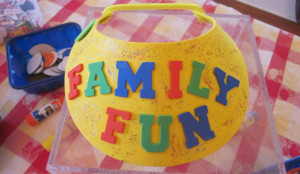 What does your Mom (or Dad) still like to do? You may or may not know the answer to this question. What did she used to like to do? Putting a list together, that is readily available, will help you at different times when you need to distract your loved one.
What does your Mom (or Dad) still like to do? You may or may not know the answer to this question. What did she used to like to do? Putting a list together, that is readily available, will help you at different times when you need to distract your loved one.
You may need to distract your Mom for a variety of reasons. Perhaps it’s her safety that you are concerned about…you might discover that your Mom is putting herself at risk because she still has chemicals under the kitchen sink or she is leaving the gas burners turned on for hours on end. Perhaps it’s her repetitive speech…she’s asking you the same question many times an hour. Perhaps she is trying to leave the house on her own…Perhaps she has become stubborn and belligerent because she wants an item that you don’t think she should have in her hands.
So when you need to distract her, continually saying no or raising your voice in response, is not going to help the situation. Knowing what activities your Mom likes to do or tasks she is still capable of doing will make a huge difference in how she reacts to you in those difficult moments.
The fifth stage in Maslow’s Hierarchy focuses on individuals having a sense of purpose in life. Humans need to be needed, but they also need to feel like they are doing something productive.
Now you may say that your Mom would have no idea if she was doing something meaningful or not. When you can provide Mom with an activity that ties in with what your Mom has done all of her life, she will feel good about what she is doing. She may or may not be able to express her sense of satisfaction with what she has accomplished, but completing the task and receiving compliments from you for what a great job she has done, helps her to feel like she has accomplished something positive and given her purpose.
The tasks may be very simple but can provide her with a great sense of success. A few suggestions…
Sorting buttons by color or by size
Washing and drying bingo chips
Sorting coins
Telephoning a daughter or son
Folding napkins, pillow cases or towels (Once they have been folded, they can be taken away and undone, only to return in need of folding again)
Washing dishes or silverware (or plastic cups and plates)
Separating playing cards by color or suits
Cutting coupons
Going for quiet walks or sitting in the park or on the back porch
Cutting pictures from magazines
Watching videos of animals or old TV programs on the internet or DVD
Listening to favorite or relaxing music
Labeling the back of each puzzle piece with the same letter or number (So if the pieces get separated you will know which puzzle they belong to)
Coloring in “adult-like” coloring books
Recording the reading of stories to send to great-grand children
Skyping with a relative who lives around the corner or far away
The nice thing about these kinds of activities is that any member of the family or even a neighborhood friend can assist. They are not difficult, but take planning. Whether your children are 5, 9, 20 or 36 they can each do their part to help with Grandma by spending time with her.
Life in today’s world is very busy, there’s no question about that. Taking time in advance for family members to figure out what they might do to have fun with Grandma or keep her busy will create positive memories that will linger for a long time. And you as the caregiver will be able to pay those bills or maybe even have a cup of tea.
Photo Credit: www.artsalamance.com

Leave a Reply